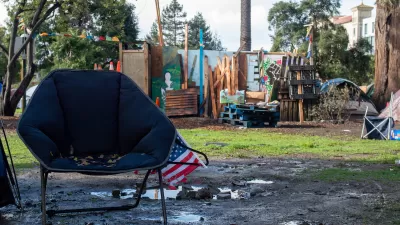The U.S. is in the midst of an affordable housing crisis. But as the landmark Mount Laurel saga illustrates, many communities object to developing such housing. Corianne Payton Scally argues that states should work harder to promote such projects.
"The affordable housing industry is increasingly focused on clear and effective messaging as the means of convincing skeptical bystanders to support more funding and regulations to increase [affordable housing] supply and subsidies," observes Scally.
But while national approaches can be effective, battles over specific projects often take place in an environment of local skepticism. A recent survey conducted by the ReThink Initiative "found most people want everyone to have a 'decent and safe place to live', but don’t want to live near public housing themselves."
"State governments are in an excellent position to help craft messages and resulting policies and programs to fit unique local circumstances and legacies, although few use their position to the fullest potential," argues Scally. "What if, through better messaging, targeting, and monitoring of actual outcomes, states could actually alleviate fears, combat negative legacies, and promote positive ones throughout its cities and regions?"
"More than just calculating numbers," she recommends, "states could provide a comprehensive vision and plan for affordable homes that is sensitive to local contexts, but willing to challenge them."
FULL STORY: Can Better Messaging Overcome NIMBY?

Planetizen Federal Action Tracker
A weekly monitor of how Trump’s orders and actions are impacting planners and planning in America.

Maui's Vacation Rental Debate Turns Ugly
Verbal attacks, misinformation campaigns and fistfights plague a high-stakes debate to convert thousands of vacation rentals into long-term housing.

San Francisco Suspends Traffic Calming Amidst Record Deaths
Citing “a challenging fiscal landscape,” the city will cease the program on the heels of 42 traffic deaths, including 24 pedestrians.

Defunct Pittsburgh Power Plant to Become Residential Tower
A decommissioned steam heat plant will be redeveloped into almost 100 affordable housing units.

Trump Prompts Restructuring of Transportation Research Board in “Unprecedented Overreach”
The TRB has eliminated more than half of its committees including those focused on climate, equity, and cities.

Amtrak Rolls Out New Orleans to Alabama “Mardi Gras” Train
The new service will operate morning and evening departures between Mobile and New Orleans.
Urban Design for Planners 1: Software Tools
This six-course series explores essential urban design concepts using open source software and equips planners with the tools they need to participate fully in the urban design process.
Planning for Universal Design
Learn the tools for implementing Universal Design in planning regulations.
Heyer Gruel & Associates PA
JM Goldson LLC
Custer County Colorado
City of Camden Redevelopment Agency
City of Astoria
Transportation Research & Education Center (TREC) at Portland State University
Jefferson Parish Government
Camden Redevelopment Agency
City of Claremont





























